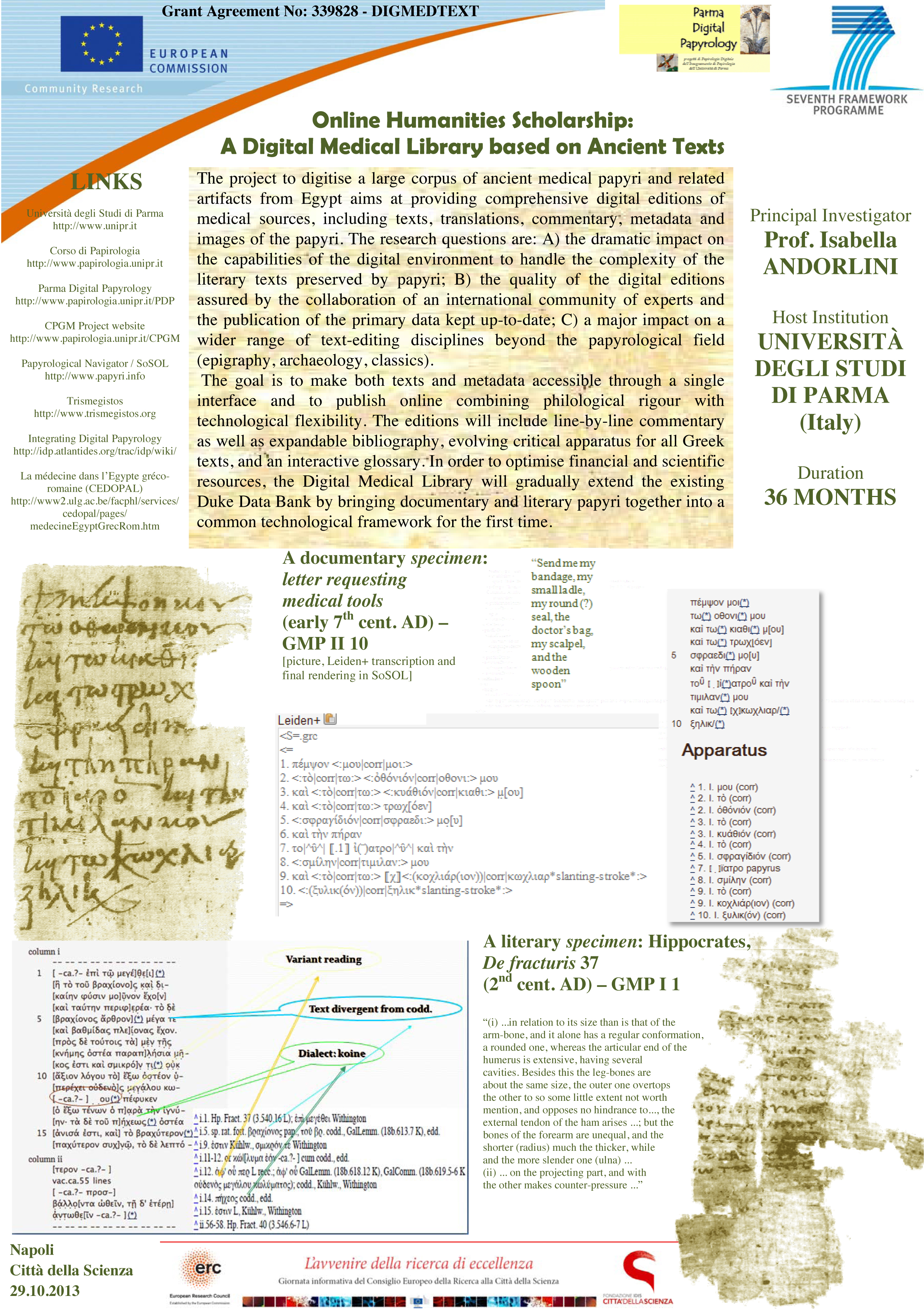SEVENTH FRAMEWORK PROGRAMME
EUROPEAN RESEARCH COUNCIL EXECUTIVE AGENCY
GRANT AGREEMENT FOR: ADVANCED GRANT
Project Acronym: DIGMEDTEXT
Project Full Title: Online Humanities
Scholarship: A Digital Medical Library based on Ancient Texts
Grant Agreement No: 339828
Duration: 36 months
Principal Investigator: Prof.
Isabella ANDORLINI
Host Institution: UNIVERSITÀ DEGLI
STUDI DI PARMA (Italy)
SUMMARY OF THE PROJECT
The project to digitise a large corpus of ancient medical papyri and
related artifacts from Egypt aims at providing comprehensive digital
editions of medical sources, including texts, translations, commentary,
metadata and images of the papyri. The research questions underlying
the present proposal are: A) the dramatic impact on the capabilities of
the digital environment to handle the complexity of the literary texts
preserved by papyri; B) the quality of the digital editions assured by
the collaboration of an international community of experts and the
publication of the primary data kept up-to-date; C) this pilot project
will have a major impact on a wider range of text-editing disciplines
beyond the papyrological field, for example also in epigraphy,
archaeology, and in classics.
(1) Main objective. The goal
is
to make both texts and metadata accessible through a single interface
and to publish online combining philological rigour with technological
flexibility. The editions will include line-by-line commentary as well
as expandable bibliography and evolving critical apparatus for all
Greek texts. In order to optimise financial and scientific resources,
the Digital Medical Library will gradually extend the existing Duke
Data Bank by bringing documentary and literary papyri together into a
common technological framework for the first time.
(2) Strategical vision. The
core strategy of DIGMEDTEXT is the interaction of the worldwide
community of cooperating and coopted participants who will both enter
new literary and sub-literary texts of medical content, as well as
thoroughly revise and improve existing editions. Openness and dynamism
will characterise our searchable database: it will not be a mélange of
fixed data, but rather a constantly changing set of fully open data
sources monitored by the scholarly community and maintained by all
coopted experts who care to participate. There is a serious risk that
despite the considerable amount of texts entered and re-edited
scientifically, still no coherent and/or synthetic picture of ancient
medicine and its literature will emerge and that the links that will be
established will prove incidental.
(3) Co-operation Towards Co-evolution.
To enhance the educational and scientific value of the project, an
integrated task force of young scholars and reputed team members in
Europe (Parma, Heidelberg, London, Cambridge, Oslo) will interact with
the team of the SoSOL workspace (the innovative software named Son of
Suda Online and housed at NYU), to develop a core set of
non-document-specific encoding and use-needs that will improve the
current DDB markup and enhance its performance.
(4) Innovative lexicographical
infrastructure.
This initiative focuses on the specific subset of literary texts. Their
exegesis, which reveals medical terminology unattested in other medical
texts, will be intertwined with an interactive dictionary of scientific
terminology attested in the medical papyri, with attention to Greek and
Latin technical words surviving into modern scientific discourse. The
dictionary (possibly with links to the Thesaursus Linguae Graecae) will
be produced directly via the PN/SoSOL interface, for this enables
lemmatised searching.
(5) Outcome and dissemination.
The corpus of medical papyri itself needs no championing: the texts are
a treasure trove of information about the development of ancient
science, on its penetration into Egypt —and, by extension, into regions
of a broader Mediterranean world, ultimately to be spread by the Romans
to the entirety of Western Europe. The DIGMEDTEXT will become an
invaluable research tool for the entire community of papyrologists,
ancient historians, historians of science, philologists, and digital
humanists. Circulation of researchers and availability of results will
be provided by yearly training sessions. Recruitment and specialisation
of junior researchers, circulation of senior researchers and joint
interpretation of results will be secured by annual workshops which
will result in joint publications, defined thematically. The PI will
lay the foundation for producing the first monograph in English
dedicated to an in-depth-discussion of the contribution of medical
papyri and related artifacts to the knowledge of ancient medicine as
theory and practice. A final Conference will centre on medical
semantics (and, when applicable, pragmatics) as illuminated by the
papyri. New intellectual relationships among disciples and their
disciplines are expected to result.
Responsabile Scientifico Isabella Andorlini | Web Master & Designer Nicola Reggiani | © 2014-2015 Corso di Papirologia UniPR

